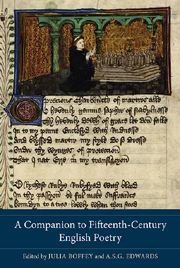1 - The Patronage of Poetry
from Part I - Background and Context
Published online by Cambridge University Press: 05 July 2013
Summary
In 1445, when Isabel Bourchier, Countess of Eu, commissioned the Augustinian friar, Osbern Bokenham, to write a life of Mary Magdalene for her, she used a phrase in relation to her patronage that seems to be a gracious request, apparently leaving Bokenham a choice in the matter: ‘If ye liked þe labour to take’ (Bokenham, ed. Serjeantson 1938: line 5074). Bokenham is, however, open about the quandary in which she places him. Further on in the ‘Prolocutorye’ to the Legend, following the conventional rehearsal of the modesty topos, doubting, he ruminates:
I thowt how hard it is to denye
A-statys preyer, wych aftyr þe entent
Of þe poete is a myhty comaundement. (lines 5082–4)
Isabel consents that he should visit the shrine of St James, as was his wish, before he begins his task, but Bokenham then writes again of his ‘ladyis wyl & hir comaundement’ (line 5118), which overrides a commission he had already undertaken, to write of the life of St Elizabeth of Hungary:
At request of hyr to whom sey nay
I neyther kan, ne wyl, ne may,
So mych am I bounden to hyr goodnesse,
I mene of Oxenforthe þe countesse,
Dame Elyzabeth ver. (lines 5051–5)
Political considerations almost certainly underlay this postponement of Elizabeth de Vere's request: Bokenham's friary of Clare, Suffolk, was beholden to Isabel Bourchier's brother, Richard, Duke of York, for patronage, and the 1445 translation of Claudian's De Consulatu Stilichonis (BL, Add. MS 11814, made in the house) contains a fulsome dedication to him.
- Type
- Chapter
- Information
- A Companion to Fifteenth-Century English Poetry , pp. 7 - 20Publisher: Boydell & BrewerPrint publication year: 2013



